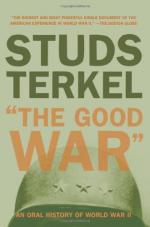
|
| Name: _________________________ | Period: ___________________ |
This test consists of 15 multiple choice questions and 5 short answer questions.
Multiple Choice Questions
1. What were the two big top secret projects?
(a) The China Project and the Brooklyn Project.
(b) The Antarctic Project and the Los Alamos Project.
(c) The Manhattan Project and the Arctic Circle Project.
(d) The D-Day Project and the V-J Day Project.
2. What does Erich Luth say the German nation lacks?
(a) Personal courage.
(b) Military courage.
(c) Communal courage.
(d) Civil courage.
3. How did Galatea Berger remember soldiers smelled in Germany?
(a) Soldiers smelled unwashed and unpleasant.
(b) Soldiers smelled like cigarettes, gum, and chocolates.
(c) Soldiers smelled like gunpowder.
(d) Soldiers smelled like alcohol and tobacco.
4. How was Joseph Small released from the service?
(a) He was given a discharge under dishonorable conditions.
(b) He was given an honorable discharge.
(c) He was given a discharge under honorable conditions.
(d) He was given a dishonorable discharge.
5. What was Battle Fatigue called during World War I?
(a) Attention deficit disorder.
(b) Post-traumatic stress disorder.
(c) Restless leg syndrome.
(d) Shell shock.
6. According to Tommy Corcoran why did the Allies partner with Russia against the Axis?
(a) To save France.
(b) To prevent a Cold War.
(c) Because Russians were superior fighters.
(d) To prevent Hitler from overrunning Britain.
7. What did Goebler see for the first time when the Americans rescued the German submarine crew?
(a) Black men.
(b) Sophisticated equipment.
(c) Courtesy in war.
(d) People speaking English.
8. What does Gloria Gleason say bothered people most about the war?
(a) Moral issues.
(b) Waste of resources.
(c) Loss of life.
(d) Rationing.
9. What two ethnic groups does Charlie Miller believe have a "natural hatred" for each other?
(a) Russians and Americans.
(b) Americans and Japanese.
(c) Russians and Germans.
(d) Germans and Japanese.
10. What did the French army do instead of censoring mail?
(a) Held it for six months.
(b) Threw it away.
(c) Held it for thirty days.
(d) Held it for two weeks.
11. Why didn't dehydrated foods sell well after the war?
(a) Water was scarce.
(b) People were growing their own produce.
(c) Soldiers were tired of dehydrated products.
(d) Fresh produce was more readily available.
12. What impressed Herman Kogan about the trainees in boot camp?
(a) Their courage.
(b) Their selflessness.
(c) Their philosophy of war.
(d) Their patriotism.
13. Why was George Page able to buy beachfront property cheaply during the war?
(a) People were only building in the cities.
(b) People weren't interested in buying real estate.
(c) People expected a Japanese invasion.
(d) People had no money to invest.
14. What did Richard Leacock say was his worst memory of WWII?
(a) The loss of friends.
(b) The army film about venereal disease.
(c) The bombing.
(d) The terrible food.
15. After the war, how did the community in Long Beach change, according to Sheril Cunning?
(a) People were tired of sacrifice and began to complain.
(b) People welcomed the returning soldiers.
(c) People were proud to sacrifice.
(d) People pulled together to rebuild.
Short Answer Questions
1. According to Ray Wax, why did Americans feel good during WWII?
2. How did Yasuko Kurachi Dower believe most Japanese civilians felt about the war?
3. Why did Erich Luth refuse to fire his gun in the German army?
4. How did the Japanese people feel about the Japanese war veterans?
5. Why were the Japanese pleased when American officers chose their homes to occupy?
|
This section contains 570 words (approx. 2 pages at 300 words per page) |

|




